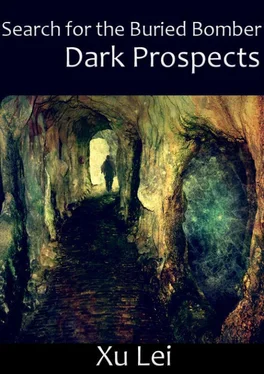Fainting from exhaustion was very shameful. I tried to change the subject and asked what they’d been talking about. Pei Qing said Old Cat had drawn a contoured map of the cave. Now they were figuring out what the rest of the river might look like and how best to proceed. Hearing this, I was perplexed. “Why are we continuing?” I asked. “Aren’t you all the rescue team?”
They were silent. Old Cat continued to smoke his cigarette, the ember glowing brightly in the dark. Then he sighed. I asked again. At last, Wang Sichuan responded. His voice was dry and constricted. “Old Cat said we’re not the ones they’re here to rescue.”

CHAPTER 21

The Real Rescuees
The bonfire flickered before me, crackling as a light breeze fanned the flames. The firelight distorted the faces of those sitting around it, Old Cat’s most of all. I could make out no more than a dim outline of his features, their expression a mystery to me. We weren’t the ones they were here to rescue?
At first I didn’t quite understand, but when I thought of Yuan Xile, a slow realization crept over me. Still, I had to be sure. “Then who are you here to rescue?” I asked, looking over at Old Cat, hoping he would give a clearer explanation.
The two new prospectors had been chatting a short ways away. As soon as they heard my question they stopped talking and turned toward us. Wang Sichuan and Pei Qing stared into the flames, not making a sound. Evidently, this question had already been asked.
Old Cat regarded me from across the fire. Tossing his cigarette butt on the ground, he said in a low voice, “It’s not up to me to say. You’ll know when we find them.”
Silence descended once more. No one spoke. At last, Wang Sichuan whispered, “This time, I don’t agree with the military.”
Old Cat responded brusquely. “It’s a soldier’s duty to obey orders. If you have a problem, take it up with Rong Aiguo after we’re out of here.”
We all sighed. It wasn’t that Old Cat didn’t want to tell us. He just couldn’t reveal such confidential information in front of so many people. That kind of slip could lead to a court-martial. In any case, we were all military men. Though we might serve in a relatively unusual capacity, we had to obey orders. Every aspect of the military relies on this basic tenet, and we knew that when we enlisted.
So Wang Sichuan cursed once and said no more. The two prospecting specialists who had been looking over at us went back to their conversation. To lighten the mood, I spoke up again. “Well, never mind all that. So what have you figured out so far? I’d like to hear it.”
Pei Qing also wanted to ease the tension. He handed me the map Old Cat had drawn. “We just showed him where the iron door was located,” he said. “We were discussing what might be hidden beneath the door.”
I thought once more of that strange door. By now, it must be deep underwater. Old Cat’s map was a long, hastily sketched passageway. It was easy enough for me to identify the places we’d been. Old Cat had drawn a big question mark where the iron door was. Pei Qing said they’d asked the engineering corpsmen about it. The engineering corpsmen had replied that there were two possibilities. The first was that it wasn’t a door at all, but rather the cement base of some temporary crane. Should it be necessary to lift some relatively large airplane component—an engine, for example—a heavy-duty crane would probably be required. The iron door might very well be a remnant of the crane’s concrete-and-steel base.
I paused for a moment to recall the place. Bullshit, I thought. It was definitely some kind of door.
“What about the second possibility?” I asked.
“Now this one is interesting,” said Pei Qing. “The corpsmen said that if it’s not a concrete base, then it’s definitely a precisionblasting site, meaning it’s filled with explosives. They’re certain that in the space behind the door deep holes were drilled into the load-bearing layer of cave rock, then filled at key points with an extremely large quantity of water and shock-proof explosives. That way, if the situation ever became critical, the Japanese could seal the cave off at a moment’s notice, buying themselves some time. Only a select few higher-ups would know the detonation codes required to carry out this ‘sacred’ task. For some reason, however, the Japanese sealed the iron door shut when they left. Clearly they hadn’t wanted to block the cave off entirely. Or maybe the only people who knew the detonation code had already died.”
“You’re saying that we were standing on a heap of dynamite?” I asked.
“No,” interrupted one of the corpsmen behind us, “a huge heap of dynamite.”
The engineering corpsman who spoke up was relatively old, perhaps even older than the deputy squad leader. He pushed his way in between us. Old Cat introduced him as Tang Zeding, company commander of the engineering corps and a veteran just returned from the Chinese-Indian border. Obviously the two of them knew each other. Old Tang had a completely different personality from the deputy squad leader, and perhaps due to his higher rank, he never hesitated to engage with us. After sitting down, he began to speak: “They say that back then, the Japanese generally used Type 97 explosives, a synthesis of TNT and some shit I can’t remember—benzene or something. They’re hugely powerful in water.” He added that we shouldn’t worry. The Japanese had plenty of experience rigging explosives. They weren’t going to go off by accident. He also believed that the location of the explosives showed that the Japanese considered the cavern a key strategic point. The explosives were a fail-safe in case the Japanese lost control of the cavern. If this assessment was true, then the rest of the underground river should be comparatively safe to travel.
“I’m glad you think so,” Wang Sichuan said sarcastically, patting Old Tang on the back.
“So that’s what we’ve been discussing,” said Pei Qing, “but there’s something else we need to address. I’m talking about the issue of Yuan Xile and Chen Luohu.”
What is he talking about? I thought to myself.
“What issue?” I asked. “Aren’t they still waiting for us upriver?”
Pei Qing shook his head. “Old Cat said that when his group arrived, they found our equipment and the corpse of the martyred soldier, but Yuan Xile, Chen Luohu, and the engineering corpsman were nowhere to be seen.”
How could that be possible? Pei Qing said they had two hypotheses: either Old Cat somehow missed Yuan Xile and the other two, or the three of them realized the water was rising, came to rescue us, and ran into some sort of trouble. “In any case,” he said, “we can’t go back and look for them now. All we can do is pray they’re all right.”
My heart was overcome with worry. Chen Luohu and Yuan Xile were both unable to care for themselves. Would that young soldier really be able to look after them?
The discussion moved on to the course of the river. Some suggested we use mise-á-la -masse (a contour map created by measuring how electrical current passes through minerals) to map the area around us, but this data was only approximate and we needed detail. Then a noise suddenly echoed across the cave. We turned our heads. Two of the engineering corpsmen had walked a great distance away from the camp along one of the terraces. All we could see were the beams of their flashlights bobbing in the dark. The deputy squad leader yelled for them to return, but they waved for us to come over, pointing with their flashlights at the roof of the cave.
Читать дальше














